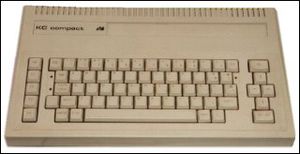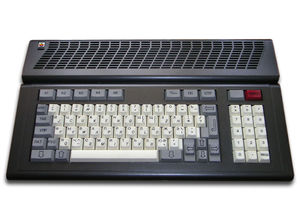Clones
Contents
VEB Mikroelectronic KC Compact
Note: This is the edited translation of a magazine advert for the computer. I don't know the original translator, so I'm afraid no credit can be given.
The KC compact is a new developed home computer, made by VEB Mikroelektronik "Wilhelm Pieck" Muehlhausen. The system can be expanded software- or hardware-wise.
The KC compact is a compact, easy to use computer. It consists of a base unit with integrated keyboard and an external power supply. An RGB-monitor or a (non)colour-TV can be connected. A cassette recorder is used to store data. A disc-drive is to follow soon.
The homecomputer sports an 8-bit-processor, 64 Kbyte RAM and 32 Kbyte ROM. The BASIC-interpreter with an extended instruction set (181 instructions) and the operating system (non KC-85 compatible) are stored in ROM.
The KC compact has a sound-generator with three channels and 8 octaves.
In comparison with KC-85-system the KC compact has a new design: the newly designed keyboard has 69 keys. The keyboard is programmable (ASCII-codes, autorepeat on/off). Seven keys may be programmed with words and instructions (jobs).
External equipment (like a disc drive) can be connected to the the expansion port. There are connectors for cassette recorder, joystick, sound and a centronics-printer port.
Graphic modes
The computer supports three graphic modes:
- mode 0: 200 * 160 pixels with 16 of 27 colours
- mode 1: 200 * 320 pixels with 4 of 27 colours
- mode 2: 200 * 640 pixels with 2 of 27 colours
Independent of screenmode there are 25 lines. The number of characters per line depends on the screenmode.
- mode 0: 20 characters/line
- mode 1: 40 characters/line
- mode 2: 80 characters/line
Technical data
- name: microcomputer KC compact
- construction type: base unit with integrated keyboard and external power supply
- dimensions: base unit 390x220x50mm, power supply 125x76x62mm
- weight: ca. 3500 g
- protection class: IP20 TGL RGW 778
- power: 25 watts
- voltage: 220 V/external power supply
- processor: UA880
- clock frequenzy: 4 MHz
- memory: 32 Kbyte ROM (operating system, BASIC),64 Kbyte RAM, 42 Kbyte free for user
- resolution: 640x200 with 2 of 27 colours, 320x200 with 4 of 27 colours, 160x200 with 16 of 27 colours
- max. pixels: 128,000
- palette: 27
- screen unit: normal (non)colour-TV or monitor with RGB-input
- TV-connector: HF-modulator, ch 36, PAL or SCART-connector
- ports: expansion port, joystick, tape, sound, parallel printer port (centronics)
- external data storage: cassette recorder
- tape-interface: 1000 bit/s, 2000 bit/s switchable non KC-85 compatible
- sound: 3 channels, 8 octaves, sound- and SCART-interface (stereo) HF-interface (mono)
- keys: 69
- lines: 25
- charaters per line: 20/40/80
- programming languages: BASIC (ROM), other languages can loaded from tape/disc (assemler,pascal)
- KC compact includes: ground device, power supply, BASIC-handbook, Demo-tape
Aleste 520EX
The following clone has not been confirmed. There is only one source ([1]) available.
There was one clone of CPC maden in Russia at 1994. Its name was Aleste 520EX.
Technical specs: Z80, 8MHz, 512KB, RTC, 320x200x16 and 640x200x4 colors with 512 palette, mouse, expansion slot, DMA. It was an all-in-one-box machine with an external 3.5" disk drive. It also sported an external 4-channel, 8-bits per channel sound card which plays s3m and stm files.
This two-faced machine runs all original CPC software (CPC+ too?) and also MSXDOS whith command line tools, C compiller and several windowed tools: text-editor, debugger, disk-editor. The computer has software emulator of MSX2 video controller and runs several MSX2 games. The clone used by MSX users and homebrewers.

